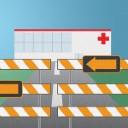-
Financial Screenings for People with Cancer
Cancer patients say they want to be asked about their financial needs on a regular basis.
by Pamela Appea
-
Putting the Patient in the Driver’s Seat
In her new book, Cancer Support Community executive chair Kim Thiboldeaux offers advice to patients on how to steer their way through a cancer diagnosis, treatment and beyond.
by Kevin McLaughlin
-
Roadblocks to Care
Some cancer patients struggle to find transportation to their appointments. The coronavirus pandemic has further limited options for patients looking for rides.
by Anna Goshua
-
The Return to Work
What happens if your workplace reopens before you're ready to return or you're an essential worker? For some people who have been diagnosed with cancer, accommodations may be possible.
by Jen Tota McGivney
-
Parking Costs Take a Hidden Toll on Cancer Patients
People with cancer can pay significant costs for parking at cancer centers while receiving their treatment, a study finds.
by Marcus A. Banks
-
Using Leftover Cancer Drugs to Help Others
Cancer drug repositories that accept unused drugs could provide an affordable source of medications for patients in need, while also providing patients left with extra drugs a way to give back.
by Jon Kelvey
-
Despite Generic Imatinib, Cost of Treating CML Remains High
The arrival of generic versions of the targeted therapy imatinib only modestly reduced the cost of treating chronic myelogenous leukemia patients, a study finds.
by Anna Azvolinsky
-
Food Insecurity and Cancer
After discovering that some patients weren't able to access the food they needed, a community oncology practice partnered with a local food bank.
by Jen Tota McGivney
-
Cancer Takes an Unequal Toll on Employment
In a study of women with breast cancer in North Carolina, those who lived in rural areas or were black were more likely than urban white women to report negative changes in their employment.
by Pamela Rafalow Grossman
-
Cancer and Credit
The financial burden of a cancer diagnosis can lower a patient's credit score.
by Shelly Rosenfeld
Cancer Talk
Researchers Tackle Immune-related Adverse Effects
Scientists present data on the risks of immune checkpoint inhibitors so more patients can tap into the treatment.
by Marci A. Landsmann
Tissue and Liquid Biopsy for Targeted TherapyTailored treatments led to better outcomes than standard of care when biomarker results from liquid biopsy and tumor tissue aligned.
by Eric Fitzsimmons
Cancer Vaccines Show Promise in Early TrialsWhile mRNA vaccines offer a personalized approach to triggering an immune response, peptide vaccines could be a one-size-fits-all treatment. Researchers are exploring both options.
by Thomas Celona
Declining Breast Cancer Mortality in Younger WomenU.S. breast cancer deaths declined for women ages 20 to 49, which researchers credit to wider screening and better treatment.
by Kevin McLaughlin














